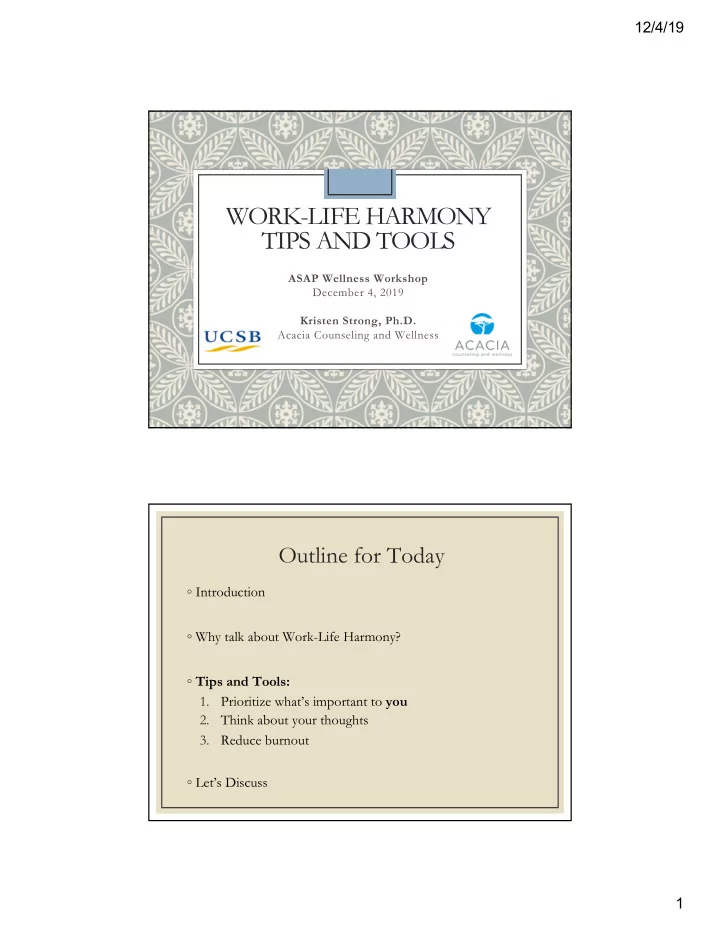

12/4/19 WORK-LIFE HARMONY TIPS AND TOOLS ASAP Wellness Workshop December 4, 2019 Kristen Strong, Ph.D. Acacia Counseling and Wellness Outline for Today ◦ Introduction ◦ Why talk about Work-Life Harmony? ◦ Tips and Tools: 1. Prioritize what’s important to you 2. Think about your thoughts 3. Reduce burnout ◦ Let’s Discuss 1
12/4/19 Work Life Harmony Balance versus Harmony Why talk about Work Life Harmony? ◦ We cannot separate work and life ◦ Amount of time in each area does not determine quality of life ◦ Work and life changes frequently ◦ Work life harmony uses approach that the more fulfilled and satisfied we are at work, the more energized and motivated we are at home, and vice versa 2
12/4/19 Tips and Tools 1. What is important to you 2. Think about your thoughts 3. Reducing burnout 1. What is important to you? 3
12/4/19 1. What is important to you ◦ We each have different wants, needs, passions, values ◦ What areas do you find important? ◦ You have permission to choose and change your priorities 1. What is important to you right now? Career and Work Money Promotion Mental Health Health Traveling Family Hobbies Children Music Friendships Spirituality School Environment Romantic Relationship Fitness Outdoors Creativity Contribution Community 4
12/4/19 1. What is important to you right now? Exercise: Think of which 6 areas are most important to you right now. Evaluate how fulfilled you are in each area? 1= not fulfilled, 10 = very fulfilled For areas that are lower, what would it look like to be a 7-8? How can you prioritize or make changes to be more fulfilled in these areas? 2. Think about your thoughts 5
12/4/19 2. Think about your thoughts ◦ Our thinking alone is a huge factor for stress and discouragement ◦ How we think impacts how we feel and behave, both at work and at home ◦ Paying attention to our thoughts can help reduce stress and increase fulfillment 2. Think about your thoughts ◦ Thoughts are not facts ◦ We often create a narrative to go along with our thought ◦ Unhelpful thought patterns lead us to feel more sad, angry, stressed, down ◦ Helpful thought patterns helps us to feel more fulfilled, confident, and engaged 6
12/4/19 2. Think about your thoughts They didn’t like my presentation Discouraged, down, anxious They think I’m People leave 10 dumb minutes early from my presentation They wanted to avoid the rain Fine, excited, good They had a meeting right at 1:00pm 2. Think about your thoughts If your thoughts are not helpful, consider… 1. Am I confusing a thought with a fact? 2. Am I jumping to conclusions? 3. What is the evidence for or against my thought? 4. As I assuming my view is the only one possible? 5. Am I expecting myself to be perfect? 6. Am I blaming myself for something which is not really my fault? 7
12/4/19 2. Think about your thoughts Exercise: If your boss excludes you from a meeting, what are several thoughts that you could have? Which thoughts are helpful and which are not helpful? For unhelpful thoughts, how can you challenge them? 3. Reducing burnout 8
12/4/19 3. Reduce Burnout True or False… � 1. Burnout can come from personal life ❌ 2. Vacation will fix burnout � 3. Some stress is beneficial � 4. It shows strength to communicate about burnout ❌ 5. Productivity and success come with burnout 3. Reduce Burnout Stress versus burnout Impact of burnout 9
12/4/19 3. Reduce Burnout Signs of Burnout Physical Signs Emotional Signs Behavioral Signs • Tired and drained most • Loss of motivation • Skipping work or of the time coming in late • Negative outlook • • Lowered immunity Withdrawing from • Sense of failure responsibilities • Frequent headaches, back • Detachment • pain, muscle tension Using food, alcohol, or • Irritability drugs to cope • Over eating or under • Feeling helpless • eating Difficulties • Dread going to work concentrating • Change in sleep habits • Apathy • Conflicts with colleagues or supervisors • Decreased passion • Missing deadlines 3. Reduce Burnout Exercise: What are your personal signs of burnout? What is helpful to do or consider when you are beginning to burn out? ◦ Saying no ◦ Delegating ◦ Communicating to coworkers ◦ Find a network or peer group ◦ Getting away from desk 10
12/4/19 What to take away… 1. Regularly evaluate the important areas in your life. What areas are going smoothly and which need more attention at the moment? 2. Become aware of your thoughts and challenge thoughts that may not be helpful? 3. Identify when you may be starting to burn out and be proactive in managing stress What to take away… 11
12/4/19 Thank You! ◦ Questions ◦ Thoughts and Discussion Dr. Kristen Strong Acacia Counseling and Wellness dr.kristen@acaciacw.com www.acaciacw.com 12
Recommend
More recommend